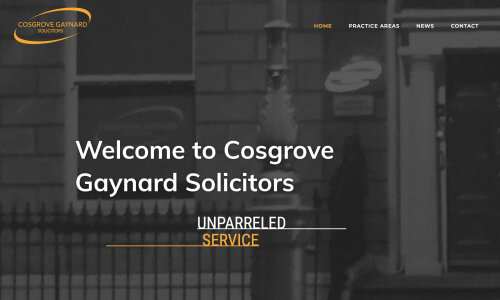Best Appeal Lawyers in Ireland
Share your needs with us, get contacted by law firms.
Free. Takes 2 min.
Or refine your search by selecting a city:
List of the best lawyers in Ireland
About Appeal Law in Ireland
Appeal law in Ireland allows a party to question the legal aspects of a decision made by a lower court and seek a review or reversal of that decision by a higher court. In the Irish legal system, the process of appeal is an essential aspect of the judicial framework, providing a mechanism for correcting errors and ensuring justice. Appeals can be made in civil, criminal, or administrative cases, depending on the nature and jurisdiction of the matter.
Why You May Need a Lawyer
There are several reasons why an individual or entity might seek legal assistance in matters of appeal:
- If you believe that a court decision was unfair or incorrect, a lawyer can help you assess the grounds for an appeal.
- Legal counsel can aid in preparing the necessary documentation and ensuring compliance with procedural rules for filing an appeal.
- An experienced lawyer can present arguments effectively in higher court by highlighting legal errors in the original judgment.
- If you're opposing an appeal, a lawyer can help defend the original decision and argue why it should be upheld.
Local Laws Overview
Appeal laws in Ireland are governed by several legislative and procedural frameworks:
- The Rules of the Superior Courts govern appeal procedures from the High Court to the Court of Appeal and the Supreme Court.
- The Court of Appeal Act 2014 established the Court of Appeal and provides the jurisdiction and procedure for appeal cases.
- Civil appeal procedures often require "leave to appeal," meaning permission from the court is needed to proceed with an appeal.
- For criminal cases, the Criminal Procedure Act regulates the right of appeal to the Court of Appeal and/or the Supreme Court.
- The appellate process is generally focused on reviewing the application of law rather than reassessing factual determinations.
Frequently Asked Questions
What is an appeal?
An appeal is a request made to a higher court to review a decision made by a lower court, seeking its reversal or modification.
What grounds are needed for an appeal in Ireland?
Appeals typically require significant issues such as errors in applying the law, procedural mistakes, or a miscarriage of justice.
How long do I have to file an appeal?
The timeframe for filing an appeal varies by case type but is typically 28 days after the date of the decision in civil cases. Criminal cases may have shorter deadlines, so consulting a lawyer promptly is crucial.
Can I introduce new evidence during an appeal?
Appeals generally do not allow for new evidence unless exceptional circumstances, such as new information that couldn't have been accessed with due diligence previously, justify its inclusion.
What is the difference between an appeal and a judicial review?
An appeal involves questioning a decision's legal aspects, while a judicial review examines the legality of a public body’s actions in making that decision.
Can anyone appeal a court decision?
No, only parties directly affected by the court decision or with sufficient interest may appeal the decision.
What is the role of the Court of Appeal?
The Court of Appeal reviews decisions from the High Court, ensuring legal standards were applied correctly and examining claims of procedural errors.
How are appeal hearings conducted?
Appeal hearings usually involve legal submissions and arguments rather than witness testimonies, focusing on the legal interpretations and applications in the original judgment.
What happens if my appeal is successful?
If successful, the higher court may overturn or modify the lower court's decision, potentially ordering a retrial, changing the judgment, or applying a new sentence.
Can the Supreme Court entertain any appeal?
The Supreme Court only hears appeals if the case involves an issue of public importance or if there are compelling reasons necessitating a review in the interest of justice.
Additional Resources
For those seeking assistance or more information about appealing a court decision in Ireland, the following resources may prove useful:
- The Courts Service of Ireland: Provides information on court procedures and contact details for court offices.
- The Law Society of Ireland: Offers resources for finding qualified solicitors and understanding legal procedures.
- Citizens Information: Offers guidance and information on various legal processes, including appeal systems.
- Free Legal Advice Centres (FLAC): Provides free legal advice and information to individuals with limited financial means.
Next Steps
If you are considering filing an appeal, the following steps may guide you in the process:
- Consult with a solicitor specializing in appellate matters to evaluate the strength of your case and determine the potential grounds for appeal.
- Gather all necessary documentation relevant to the original court proceeding, as these will be crucial for building your case.
- Ensure you understand the deadlines and procedural requirements for filing an appeal to avoid any administrative hurdles.
- Decide with your solicitor on a strategic approach for presenting or opposing the appeal based on legal precedents and case specifics.
Lawzana helps you find the best lawyers and law firms in Ireland through a curated and pre-screened list of qualified legal professionals. Our platform offers rankings and detailed profiles of attorneys and law firms, allowing you to compare based on practice areas, including Appeal, experience, and client feedback.
Each profile includes a description of the firm's areas of practice, client reviews, team members and partners, year of establishment, spoken languages, office locations, contact information, social media presence, and any published articles or resources. Most firms on our platform speak English and are experienced in both local and international legal matters.
Get a quote from top-rated law firms in Ireland — quickly, securely, and without unnecessary hassle.
Disclaimer:
The information provided on this page is for general informational purposes only and does not constitute legal advice. While we strive to ensure the accuracy and relevance of the content, legal information may change over time, and interpretations of the law can vary. You should always consult with a qualified legal professional for advice specific to your situation.
We disclaim all liability for actions taken or not taken based on the content of this page. If you believe any information is incorrect or outdated, please contact us, and we will review and update it where appropriate.
Browse appeal law firms by city in Ireland
Refine your search by selecting a city.















